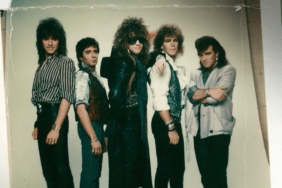Johnny Ramone
Dee Dee Ramone
Tommy Ramone
Joey Ramone
Marky Ramone
Ritchie Ramone
Elvis Ramone
C.J. Ramone
Arturo Vega
Danny Fields
Linda Stein
Seymour Stein
Debby Harry
Chris Stein
Clem Burke
Legs McNeil
Joe Strummer
Glen Matlock
Rob Zombie
Eddie Vedder
Rodney Bingenheimer
Ed Stasium
Daniel Rey
Story:
The Ramones have long been considered the originators of punk rock, influencing the formation of hundreds of bands over their 22-year career thanks to a grueling tour schedule. This documentary by Michael Gramaglia and Jim Fields looks at their career from their roots in Forest Hills, Queens thirty years ago to their induction into the Rock ‘n’ Roll Hall of Fame in 2002.
Analysis:
There are two distinct camps. Those who worship the Ramones and those who just don’t get them. The first camp remembers where they were the first time they heard the band and probably knows the lyrics to most of their songs; the latter sees the band as a joke made up a bunch of cartoon characters.
Despite their naysayers, the seminal punk band broke out of New York’s East Village music scene in the early 70’s, showing none of the musicianship of their peers Television and the Talking Heads, but creating instantly catchy and very loud pop-punk ditties that have stood the test of time. End of the Century isn’t by any means the first documentary about the band, but it offers a lot of insights into the internal turmoil that the band experienced over their career, and there are enough new insights and stories to make this provocative documentary worthwhile.
After a small bit of the Hall of Fame induction ceremony, the film cuts back to 1974 Queens, in the middle class Forest Hill neighborhood where the boys grew up, giving some idea what they were like through interviews with relative and friends. Joey (nee Jeff Hyman) was shy, Johnny (John Cummings) was the delinquent troublemaker and Dee Dee (Douglas Colvin) was just plain trouble. The three guys are pulled together as a band by quiet mastermind Tommy Erdelyi, who is in turn coerced to be the band’s drummer. The sound and the look of the band quickly took shape into something so distinct and unique that they achieved popularity in their novelty. While some of the talk of their pre band day is a bit dull, things really kick into gear with the archival footage of the band’s early shows at CBGBs. showing what a shambles they were back then. Although the evolution of the band over its career is minimal, you can certainly feel the energy they put across live, and though they never achieve the expected fame and success in the States, they’re huge in England and even bigger in Brazil.
More interesting than the performance footage are the interviews done with the members of the band. These candid discussions about the band gives the viewer a pretty good inkling about the band’s complex dynamics and the problems that kept a rotating series of drummers backing them up. With interviews done before his death, Joey comes across as the most intelligent and well spoken of the group, talking about his influences and what he hopes to achieve with the band. You can tell from the interviews that he really was one-of-a-kind. The businessman of the group, Johnny doesn’t come across nearly as well in his interviews, and not just because he is an unrepentant right winger, something which doesn’t seem very “punk”. He seems pretty clueless to the fact that his prickly personality has many of his bandmates calling him an asshole, and his reaction to Joey’s death is jaw-dropping in its lack of sensitivity. By comparison, Dee Dee plays the loveable wacko and Marky is the practical joker, providing some of the movie’s most amusing and entertaining moments, not always intentionally, but also adding to their cartoon character nature.
The movie’s most shocking revelation is the reason why Johnny and Joey barely spoke in the band’s later years, an incident that spurned the song “The KKK Took My Baby Away”. It’s something that would seem trivial to most, but it drove a wedge into the band that was never healed. Long time fans of the band will also appreciate the expose on the band’s mythic collaboration with Phil Spector, a tumultuous union that has been fodder for rumors and speculation ever since.
The testimonials from other musicians and bands that have been influenced by the Ramones over their two-decade career is impressive. The movie becomes a connect to dots to all of this year’s other rock docs with its interviews of Rodney Bingenheimer (Mayor of the Sunset Strip), Danny Fields, the Ramones’ first manager who also signed the MC5 to Elektra (MC5* A True Testimonial), and Kirk Hammett of Metallica (Some Kind of Monster). It even features one of the last ever interviews with Clash singer Joe Strummer, who also has his own documentary in the works. Journalist Legs McNeil also offers some entertaining anectodes. These interviews give you a great idea about the scope of the Ramones’ reach into rock and popular music and how important they were.
The Bottom Line:
Insightful and entertaining, End of the Century is the best rock documentary in a year full of them. It isn’t as technically flashy as the other docs and a lot of the band’s career is glossed over, but it’s obviously a labor of love that gets the band’s story across quite succinctly creating a movie as inspiring as the band and a true testament to what made them so great. If you’ve ever bopped your head to the Ramones’ tunes than you owe it to yourself to know this story.
End of the Century opens (where else?) in New York today.










